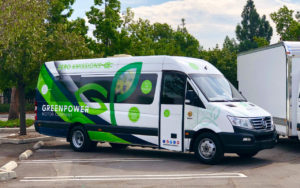In a company first, one of British Columbia’s leading EV manufacturers announces a sale of vehicles with wireless charging, after partnering with one of the world’s leading hands-free innovators

GreenPower EV Star Source: Greenpower
The deal, which sends four EV Star buses to Washington State, marks the first commercial success for the B.C.-based EV maker’s partnership with Momentum Dynamics, a leading hands-free technology innovator
Almost a year after striking a partnership to add wirelessly charged all-electric transit vehicles to its lineup of electric buses and vans, Vancouver-based GreenPower Motor Co. has announced its first sale — an order from Grant Transit Authority in Washington State for four wirelessly charged EV Star 19-passenger electric minibuses.
The buses are Grant Transit’s first foray into electric vehicles and will be operational in the fall of 2021. To support the purchase, Grant Transit, which is based in Grant County in central Washington, got funding from the U.S. Federal Transit Administration’s Low-No Program. To qualify for that program, GreenPower needed to successfully complete a Buy America compliance audit at its Southern California production facility.

“The state of Washington has always been at the forefront of early adoption of zero-emission vehicles,” said Ryan Shetterly, vice-president of sales and marketing at GreenPower. “Our partners at Momentum Dynamics played a significant role in winning this deal, and we look forward to further collaboration in the future.”
Momentum Dynamics, a wireless charging technology developer in Malvern, Pa., describes itself as “a global leader” in hands-free charging. This time last year, it and GreenPower struck a three-year original equipment manufacturer (OEM) agreement to partner on purpose-built electric transit vehicles, starting with the EV Star model.
Inherently flexible
“Wireless charging is inherently flexible, and we are delighted to extend our wireless charging offering into smaller-size shuttle bus fleets,” said Momentum Dynamics CEO Andy Daga, when the partnership was announced. “We are proud to offer the first inductive charging solution to this market. Our companies share in the excitement and huge market potential of wirelessly charged electric shuttle buses where automated fast charge capabilities are important.”

At the time, the companies said the wireless charging EV Star vehicles, which have a nominal range of about 240 kilometres (150 miles) would be sold throughout the United States, Canada and Europe.
GreenPower’s Shetterly called the new Grant Transit order a “progressive project.” In previous statements, he acknowledged that range anxiety is “a still pain point for many operators” — a concern that wireless charging can help offset as it increases operational range without the need for operator intervention.
Proving hands-free charging’s viability
For many years wireless charging has been seen as a murky branch of electrification with many naysayers touting it as an industry pipe dream. This three-way deal between a wireless charging company, a public transit authority and Canadian OEM further cements its legitimacy and potential.
Momentum, founded in 2009, is one of a handful of wireless charging companies to have successfully pushed the technology forward. Its technology has been deployed worldwide, mostly in trials, demonstrations and small-scale commercial projects, to charge delivery, public transit and taxi fleets.
GreenPower’s deal with Grant Transit is not Momentum’s first venture in Washington State. In February 2018, the company put down a 200kW charging pad in Wenatchee to service the Link Transit fleet’s first electric bus. In June 2020, it added an additional 10,300kW wireless charging pad to service 10 more BYD electric buses that Link Transit added to their fleet.
Ease range anxiety
Both GreenPower and Momentum have emphasized how wireless charging options can alleviate fleet operators’ concerns with range anxiety.
Many fleets run on unpredictable schedules with no fixed points in their rounds to ensure charging. What wireless charging offers is the opportunity to maximize efficiency by making what have traditionally been down-times (idling, queuing, parked or off/on loading) into useful charging opportunities.
“Wireless charging makes fleet management very efficient because the system delivers increased range and eliminates the need for a depot full of cables and chargers, all of which are subject to wear and tear and creates a hazardous condition for workers,” said Daga, during the company’s 2020 announcement of the expansion Link Transit partnership.






